Preparations, Traditional Teachings
9:16 min. - After the great gatherings and weddings, the Innu were already getting ready to go upriver into the bush. All opportunities were taken to pass on information to the youth.
Transcription
Narrator - After the large gatherings and weddings, the Innu were already making preparations to return to the bush. Any and all opportunities were used to pass on information to the youth. It was also the time for the midwife to meet with mothers-to-be and inquire about when and where they planned to give birth in the forest.
Véronique André - These berries are given to us for free; we'll eat them for a long time this winter. The ripe fruits are underneath, and if you shake the plant they'll fall. The best ones fall to the ground.
Anne Philomène Mestokosho - We used this moss from the marsh to make children's diapers. We cleaned it and hung it in the trees to dry. If the baby's bottom was red, we put the moss directly onto his skin. I used it on my children along with cotton diapers. That was before commercial diapers were available.
Mélina Mollen - A monster attacked you. What do you think this plant looks like?
Nukum - I think it looks like a fish. It seems to look like a fish with its mouth open.
Marie Clara Jourdain - The teachings are different for a girl or a boy. We teach the girl everything that goes on inside the house. We teach her to cook, to clean, and to put everything in its place. The girl learns to sew small things of little importance, so it doesn't matter if she ruins them. She begins over and over again, that's how she learns. The girl learns to embroider in the village. It's another story in the bush. She learns things that are really useful. But hunters' mitts and coats were embroidered so they'd be proud of their appearance and enjoy going out to hunt.
Mélina Mollen - This plant is shaped like a foetus.
Nukum - We use moss from the marsh to scour dishes and pots: it does a good job of getting rid of grease.
Armand Germain - I was 5 when I went out in the canoe with my grandfather. My grandfather taught me to hunt. He told me to pay attention to everything, to respect everything, and especially not to kill an animal for no reason. You must respect every living being. When you meet someone, you must give them something to eat, even if it's just a little, even it's only water. That's already a lot.
This is what my grandfather taught me. My father told me never to fight over the land. Even though we have a large family, we don't partition the land, we occupy it together. If I hunt, I tell my brothers, I tell them what I've done, where I've been, and I describe the state of the land. We discuss how to better protect and regenerate it, to let it rest a year or two, not to kill all the animals. My father taught us how he himself learned from his father. He showed us the land where my grandfather lived. He showed us the portages and explained what their names meant. He introduced us to fall or winter camping spots, where everything was planned around wild game and fish. My grandfather taught my father that.
Narrator - When you know how to live in the bush, being in a specific place is more or less important. What counts, is to have everything you need to live with you, such as water, wood and a place to fish. Knowing where to go and how to get there, came from listening to the elders speak about the land. They had a very precise way of describing it. They projected a mental vision of where we would be at each sunset. The Innu language enables you to describe the entire trajectory and to verify it at each sunset, just like a map. Each portage, each lake, each mountain has a meaningful name.
Armand Germain - My conception of the land is identical to that of the elders. They are the ones who taught it to me. There will always be Innu inland in the bush. I hope they will see things the same way our elders do. We must pass on this mentality, this coherent system based on respect, from one generation to the next.
Nowadays, children get angry when we reprimand them. They lack respect for their elders. That's how far out of hand things have gotten. The child needs to know that the foundations and teaching of Innu life lie in the land. Only then will he learn to behave and live as an Innu. When he goes to the seaside, when he goes to the city, he can keep his Innu mentality, a way of life based on respect. Nowadays, in a consumer society, young people are fond of all kinds of objects. They think that our way of life was worth nothing. But if the teaching is handed down properly, they'll return to the Innu mentality, the elders' mentality, whose source is respect for everything.
Music - Rodrigue Fontaine, Bill St-Onge, Luc Bacon
-
Preparations, Traditional Teachings
9:16 min
-
-
- anushkanat
- raspberries
- atshikuianessina
- sealskin boots
- inniminana
- blueberries
- kusseumieush
- all-purpose bag
- mamenikuashuna
- crafts
- massekushkamiku
- peat moss
- maushunanu
- berry picking
- pashakanu massekushkamiku
- they dry sphagnum moss
- tipainissatamu apakuanu
- she measure the canvas with her hand
- tshiashku-uaua
- seagull eggs
- uinipeku
- the sea




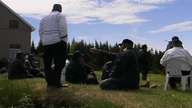
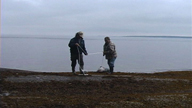
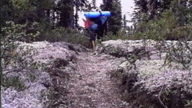
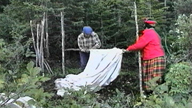
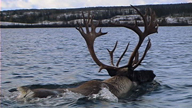
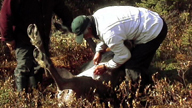
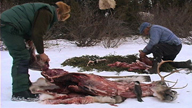
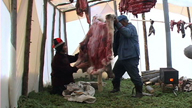
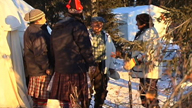
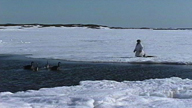
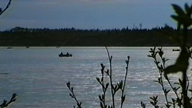
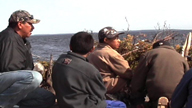
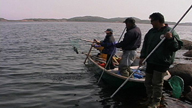
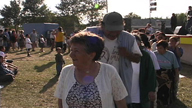
Be the first to comment!